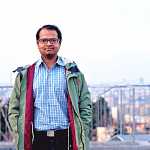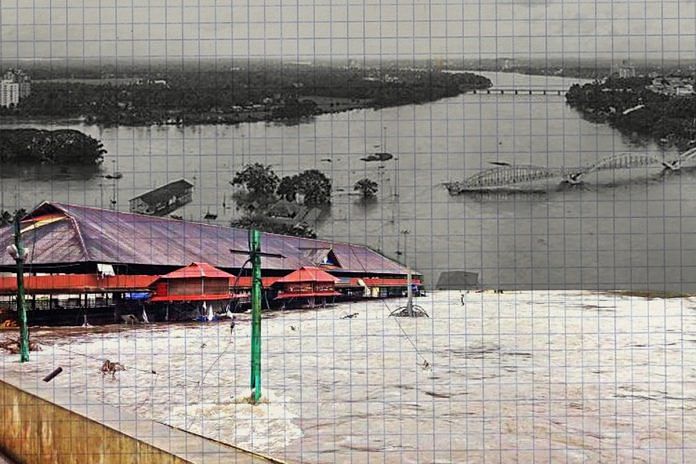The Supreme Court recently said the ban on entry of women of menstruating age in Kerala’s Sabarimala Temple is “patriarchal”.
Many Twitter users, including RSS ideologue S. Gurumurthy, linked the court’s observations with the Kerala floods, and said the devastation was the ‘wrath of Lord Ayyappa’.
ThePrint asks: Superstition about Kerala floods shows rule of faith or lack of rationalism in 21st century India?
Political use of ecological calamity to push misogynist and communal agenda should be condemned
 Kavita Krishnan
Kavita Krishnan
Secretary, All India Progressive Women’s Association (AIPWA)
We have no evidence that such superstitions are prevalent on the ground in Kerala. The people of Kerala are working incredibly hard to ensure rescue and relief to those affected. What is appalling is the deliberate manner in which RSS ideologue and RBI board member S. Gurumurthy used the floods as an opportunity to amplify a reactionary RSS agenda.
The Sangh is using a huge national calamity to try and discredit the efforts of women to secure equality through a constitutional debate in the Supreme Court. Such a suggestion is devious. The Constitution of India declares it illegal to prohibit Dalits from entering temples. Will the Sangh argue that the Gujarat earthquakes happened because Dalits insisted on entering temples?
These arguments being floated are merely for political ends. The same lot of people are linking the floods with Keralites being beef-eaters or the presence of Muslims and Christians in the state. Moreover, the report by environmentalist Madhav Gadgil, who headed the Western Ghats Ecology Expert Panel, had declared six states, including Kerala, ecologically sensitive and made recommendations that many governments ignored.
But the Right-wing Swarajya magazine is giving this a communal twist, implying that the Left and the Congress governments in Kerala ignored it under pressure from the Church!
The author of the report is himself saying that his recommendations have been ignored by multiple states, including Maharashtra and Goa that are ruled by the BJP. We need to take lessons from ecological research and not use the floods to spread motivated misinformation.
We should be condemning the political use of an ecological calamity to push misogynist and communal agenda, and not blame Kerala for our ‘superstitious beliefs’.
Also read: Legislating superstition: The significance of the Karnataka Black Magic Bill
Rationalists should be sensitive to emotional outbursts of Sabarimala devotees
 Rahul Easwar
Rahul EaswarPresident, Ayyappa Dharma Sena and Hindu activist
The Kerala floods have been labelled “disaster of the century”. Our state was hit by a calamity of the highest order. Ordinary people like me, who are not intellectuals or “progressive” rational thinkers, often associate these disasters with the fury of Mother Nature and with forces that are beyond our control.You can call me “irrational” or “superstitious” but ordinary devotees like me sometimes articulate our emotional responses, which do not fit the dry logical scheme of things.Having said this, I as the president of Ayyappa Dharma Sena, intervener in the Supreme Court Sabarimala case and the grandson of senior supreme priest Tantri Maheshwararu have requested through social media that Sabarimala and the Kerala floods should not be linked.
But I would appeal to rational and logical people to be sensitive to the sentiment that injustice is being done to the Sabarimala temple in the name of “progressive feminism”.
You can see that sentiment all over south India, cutting across the religious spectrum. People in Delhi may be surprised to hear that many Muslim and Christian organisations came forward to defend Sabarimala and said “don’t misinterpret rituals here and interfere in Sabarimala, which is a secular and pluralistic Hindu temple”.
Sabarimala has around 4 crore pilgrims coming there every year to see Swamy Ayyappa. If some of us have an emotional outburst about it, I am sure even the most hard-core rationalist can understand and be sensitive to it.
A rigorous scientific approach needs to be inculcated among the masses
 Nandini Jhadav
Nandini Jhadav
Pune district, executive president, Maharashtra Andhashraddha Nirmoolan Samiti
People in the 21st century India are still stuck in the medieval ages. The court has said banning the entry of women to the temple is a patriarchal practice. But people pick and choose from modernity what suits them best. Otherwise, they hold on to the same old regressive thinking. Superstitions and religion see women as lesser people and denigrate them. The Kerala floods are unnecessarily being linked to women demanding entry to temples. This just proves how much work is yet to be done to change people’s mentality. What is the point of education if people continue to hold such regressive views?
Religious people should ask themselves: where does it say that women shouldn’t be allowed inside temples? If you look at it from a scientific perspective, women having periods play an instrumental role in female reproduction. Shouldn’t we be celebrating that? Are there any temples that prohibit the entry of men? I would further argue that not enough women protest against such regressive mindset and traditions that subjugate them. Moreover, it is imperative for men to be a part of this struggle too and get rid of these superstitions.
Also read: Kerala floods show relief porn doesn’t work, only exposes our beloved politicians
Blaming progressiveness for natural disasters has been a staple for religious leaders
 Abhijeet Borkar
Abhijeet Borkar
Postdoctoral researcher at Astronomy Institute of the Czech Academy of Sciences
Humans are irrational and superstitious, often attributing random events, coincidences and statistical phenomena to supernatural origins. Historically, many events were attributed to supernatural phenomena when they were not well understood. Although science has progressed in the last few centuries, it has not resulted in a scientific temper within us, and traditional supernatural explanations still prevail in everyday life.
Blaming progressive developments for natural disasters has been a staple for religious leaders and organisations for ages. And nothing works better in this regard than a massive flood, when there is a long mythological history of gods using floods to punish people for their behaviour. For example, Christian bishops have claimed in recent years that floods and hurricanes are “a sign of God’s wrath” for legalisation of same-sex marriages and abortion in Western countries.
It is difficult to assess whether the religious figureheads genuinely believe their comments, or if it is a cynical attempt to use a natural disaster to obstruct progressive developments in a society where religious organisations have been the dominant authority.
We suffer from many cognitive biases and it takes awareness and extensive training to understand and minimise our irrationalities. It will need comprehensive effort in education and popular culture, with focus on scientific thinking and reasoning, to improve rational thought so that people can protect themselves from entities that try to take advantage of their adverse situations.
Compiled by Fatima Khan, journalist at ThePrint. You can reach her @khanthefatima on twitter.




Any one jumping to conclusions-that Gurumurthy is wrong- is not promoting scientific temper…in absence of proof, claim could be right or wrong, but not automatically wrong.
why r you stoking the flame of religion by calling Hindus, we devotees r not superstitious but we have sentiments and beliefs for the lord Ayappa and i believe that god , nature and love r one , so when our sentiments and beliefs are awfully hurt by some judges , ministers and feminists we r forced to believe in God , all the more
Great to hear that only Hindu’s are torch bearers of Superstition.
https://twitter.com/OpenDoorsCanada/status/1030212795265179649
Fantastic!